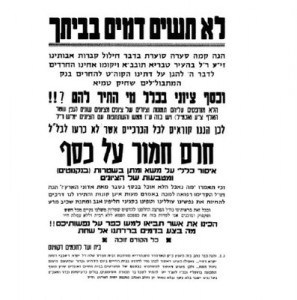This is Part III of a series on pashkevilim, the anti-establishment wall posters hung in large haredi neighborhoods. The series is based on a talk by Tzuriel Rashi of Michlelet Lifshitz and Bar Ilan University.
See Part I and Part II.
 Pashkevil forbidding the use of Zionist banknotes. Credit: Ben Chorin
Pashkevil forbidding the use of Zionist banknotes. Credit: Ben Chorin
A major concern for the haredi community in recent years has been cell phones. When chassidim who worked with troubled youth realized how easily a cell phone could be connected to the outside world, they alerted their leaders and an emergency meeting took place between the leaders of the various haredi communities. Even Rabbi Ovadia Yosef, the Sephardic chief rabbi, was invited. As a first step the haredim demanded that the cellphone companies stop selling phones with internet to the haredi public. The companies refused to give up such a lucrative source of cash.
The next step was to issue a set of draconian rules, published in newspapers and on pashkevilim, that included the immediate expulsion from school of any student found with an internet cell phone. A boycott was called and the haredi newspapers refused to advertise cellphone companies, taking a large financial loss.
Eventually the companies agreed to market an inexpensive phone for the haredi market without text messages, video, or internet. A secular columnist wrote about his wife trying to buy one when she learned how cheap it was. However, only 30% of haredim own one. One haredi told Rashi that many keep two types of cellphones: “Echad lemaan yishme’u ve-echad lemaan yirau:” One so that they may hear, and one so that they will be afraid. (The source is a combination of two biblical verses).
A few years ago the haredi community had a dispute with Bank Leumi because it wanted to build a hotel in Tiberias on top of what turned out to be a Jewish cemetery. Soon a pashkevil went up, pictured above, warning about the pictures of women and Zionists that even the most zealous haredim carry in their wallet—in the form of Israeli banknotes. After all, banknotes contain photographs of Golda Meir, Ben Gurion, and others. The only acceptable one is the NIS 1000 note with a picture of the Rambam, the medieval sage Maimonides. The pashkevil suggested a solution—reverting to a barter system. The secular press wrote about this pashkevil without realizing that it was intended as a spoof.
Another tongue-in-cheek pashkevil went up in advance of the annual kiddush on the Shabbat after the holiday of Simchat Torah and warned against the dangers of the traditional Jerusalem kugel. Five reasons were listed for banning the sweet and spicy noodle pudding:
- The long stringy noodles resemble worms, which are clearly forbidden.
- The hot kugel is served with cold pickles, which may inadvertently lead to cooking on the Sabbath, a prohibited activity.
- The kugel is often cut into triangles and resembles the foreign, suspicious food known as pizza.
- The noodles are made of flour, which is known to have kashruth issues such as insect infestation.
- The smell of the kugel in the synagogue on Shabbat morning distracts the worshipper from his prayers.
You can find a collection of fake pashkevillim at Ben-Chorin’s blog. Next week I hope to have a guest post by a blogger involved in a couple of those spoofs.
[…] Pashkevilim: Wall Posters in Jerusalem, Spoofs and Cellphones […]